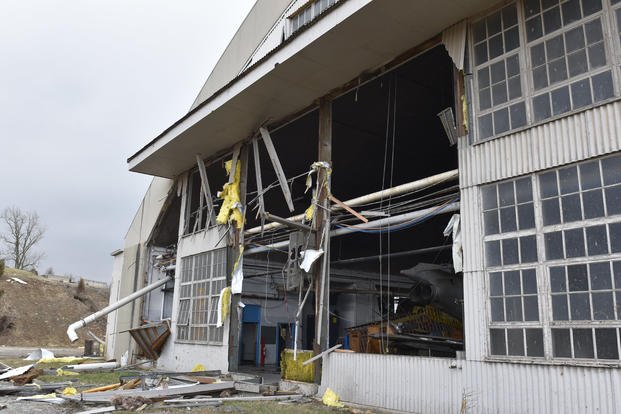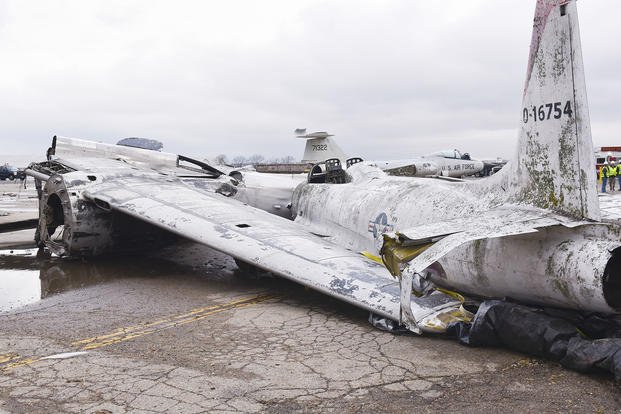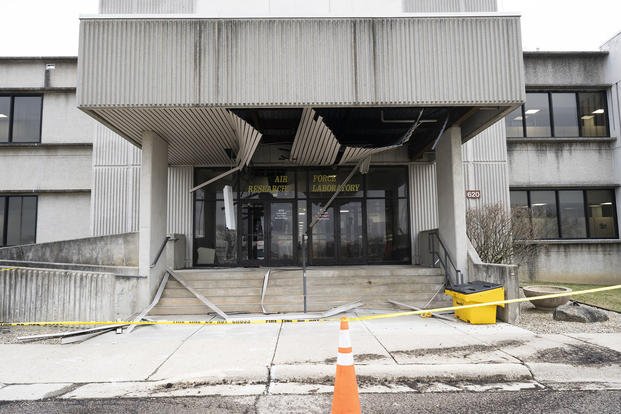Several buildings at Wright-Patterson Air Force Base, including a restoration hangar belonging to the National Museum of the U.S. Air Force, were damaged in a “suspected” tornado on Wednesday, officials said.
The museum’s Restoration Hangar 4 and several other buildings in the base’s southwestern Area B sustained damage when the tornado touched down amid what base officials characterized as several severe early morning storms, the 88th Air Base Wing said in a statement.
“Our initial assessment from this morning’s storm is the damage is isolated to the southern side of Area B,” Col. Travis Pond, the 88th Air Base Wing and installation commander, said in a statement. “Our initial focus right now is on safety and damage assessment.”
Photos of the damage released on Flickr by the 88th Air Base Wing show siding and windows torn from the sides of hangars and debris strewn across concrete runways, as well as several damaged aircraft.



A spokesman for the wing stated that none of the damaged aircraft was active in the Air Force’s fleet and all were present at Wright-Patterson for restoration by the museum. The spokesman could not say how many restoration aircraft were damaged in total.
“I can’t speak highly enough about our security forces, fire department and civil engineer airmen for their quick response and hard work to assess damage and determine a path forward for restoring operations as quickly as possible,” Pond said in the statement.
Situated just east of Dayton, Ohio, Wright-Patterson is home to Air Force Material Command and the National Air and Space Intelligence Center, and it hosts personnel from Air Combat Command and Air Education and Training Command, among other major units.
High winds and intense rain across Ohio’s Montgomery Country resulted in downed trees and power lines across the city of Riverside, which sits just west of Wright-Patterson’s Area B, the Dayton Daily News reported Wednesday.
While a tornado was confirmed in Licking County, some two hours’ drive east, the National Weather Service was still investigating whether a tornado was in fact responsible for the damage seen near Wright-Patterson and Riverside.
Wright-Patterson isn’t the first Air Force installation to endure damage in the face of a severe weather system.
In October 2018, a Category 5 hurricane slammed into Tyndall Air Force Base in Florida, damaging several F-22 Raptor air superiority fighters and causing upward of $5 billion in damage to the installation. In April 2019, floodwaters from the Missouri River engulfed Offutt Air Force Base in Nebraska, putting one-third of the campus underwater and severely damaging dozens of buildings.
As a result of damage to bases from extreme weather, the Air Force has increasingly explored ways to integrate climate resilience — building infrastructure designed to deal with escalating weather systems — into its facilities and engineering plans, an effort that resulted in the service’s 2023 Climate Action Plan.
“We cannot launch or recover aircraft on a flooded runway, nor can we operate from installations devastated by hurricanes and wildfires,” the CAP says. “Our bases are our power projection platforms and, as those bases are increasingly impacted by the effects of climate change, adapting to these challenges will be critical to meet our national security obligations.”
Related: Tyndall Air Force Base Suffers Severe Damage in Hurricane, Remains Closed






